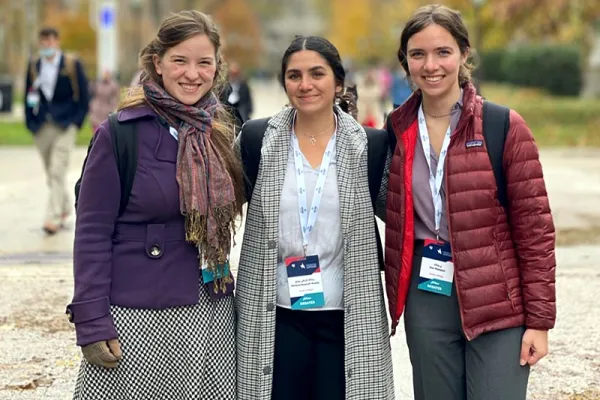‘Gaining the Trust to Stand and Argue’
Research & Inquiry

Published November 16, 2021
It’s hard enough to make a convincing argument about a complex topic—and even harder to do so in another language.
That’s the challenge that three Smith students took up as participants in the U.S. Universities Arabic Debating Championship, held in November at the University of Chicago.
Rehana Nazerali-Ruddy ’22, Bea Weinand ’23 and Nora Sullivan ’24 were among 150 students from 34 colleges and universities competing in the three-day event—the second U.S. competition sponsored by QatarDebate.
The Smith students—all advanced learners in Arabic— bested a team from Tufts University in one of four rounds of debate. They also competed against teams from Utah State University, the University of Chicago and Texas Tech University.
How did Team Smith manage such a good showing in their first-ever debate in Arabic?
“Honestly, we just did our best,” says Sullivan, who is majoring in Middle East studies. “We only had 20 minutes to prepare for each question. Luckily, they gave us the debate questions in English and Arabic.”
“We had vocabulary lists,” adds Weinand, who has been studying Arabic since her first year at Smith. “You don’t realize how many specific vocabulary words you need until you get a question about space tourism.”
Their winning debate centered on a question about market liberalization in developing countries—with the Smith team assigned to argue in favor.
“The first day of the debate, we felt out of our depth,” says Nazerali-Ruddy, a history major who began studying Arabic just last year. “But by the second day we felt better equipped in how we were making our arguments”—even on positions they would not ordinarily agree with.
The Smith students were competing against numerous teams made up of native or heritage Arabic speakers, notes May George, a lecturer in Middle East studies at Smith, who traveled with the students to Chicago and was one of 60 judges for the debate. (May judged four rounds of competition for teams from schools including Harvard University and the University of Maryland.)
In the end, “this debate was not just about winning,” George emphasizes. “It was about learning and gaining the trust to stand and argue.”
Steven Heydemann, Smith’s Janet Wright Ketcham ’53 Professor in Middle East Studies and director of Smith’s Middle East Studies program, says the QatarDebate fits well with the college’s aim to equip students to be active users of Middle Eastern languages, and to become proficient in speaking Arabic beyond the classroom.
“The QatarDebate competition is a fantastic opportunity for the students to put their language skills to use in a setting where they'll be interacting with students from across the country,” Heydemann says. “It also reflects very well on Smith's Arabic program that we were invited to the debate, and that the students have achieved the level of proficiency needed to take part.”
During the three-day competition, Smith students formed a study group with members of a team from the University of Arizona that will continue to meet via Zoom.
Sullivan—whose interest in Arabic was sparked by a high school summer spent in Jordan—says that having to think on her feet in another language is an experience she’ll take with her into other areas of study.
The debate has already had an effect on her skills in Arabic, Sullivan adds. “I went to tutoring a half hour ago and I was able to have the kinds of conversations I’ve been wanting to have!” she notes. “I feel I got better from this intense immersion experience.”
Weinand says being part of the competition reinforced her goal of improving her conversational Arabic. “That’s where I’m strongest, and it’s encouraging to know that’s the area I’ve been focused on,” she says.
For her part, Nazerali-Ruddy says she discovered how important listening skills are to learning a language.
“Being at the debate really tuned our ears,” she says. “Even in the elevator, we were hearing more Arabic than English. Doing a lot of listening is directly associated with comprehension.”
Nora Sullivan '24, Rehana Nazerali-Ruddy ’22 and Bea Weinand '23 were Team Smith at the recent QatarDebate in Chicago.